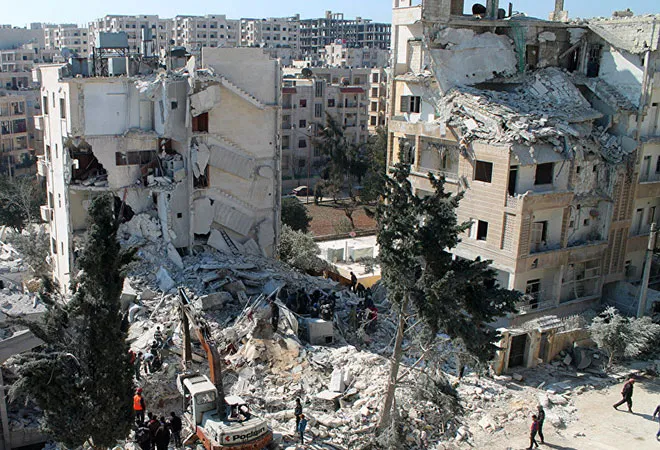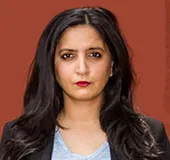
Running from the incessant bombardments and allegedly even poisonous gas, thousands have evacuated Eastern Ghouta over the last few weeks. Most have landed in Idlib in northern Syria which is dominated by an extremist rebel group with ties to Al Qaeda. The worries over the harsh social code imposed by the group are clubbed with the lingering fear of an impending assault by the regime to takeover Idlib. Syrian President Bashar al-Assad has succeeded in forcing out the rebels out of Eastern Ghouta and will now focus on the few remaining enclaves still under the control of the opposition. Running from one de-escalation zone to another, bound to be attacked another day, are the Syrians getting out of the frying pan and into the fire?
In the Idlib city, buying daily groceries in a market, Mohammad Shabib witnessed a familiar scene. His compatriots from Ghouta were stepping out of the buses which transported them from the basements in Harasta in Eastern Ghouta to the last opposition stronghold in northern Syria. Tired of a 16-hour journey, they were trawling shops across the street for supplies to meet their immediate needs.
“They wore a bewildered, hopeless expression,” Shabib says. “I looked the same when I got here,” he added.
Shabib arrived in Idlib under similar circumstances in December 2016 after the regime’s backers, Russia, and the rebels of Aleppo reached an evacuation deal. A siege leading to starvation, followed by carpet air bombing and finally a ground offensive, Bashar al-Assad adopted the same tactics in Ghouta and Aleppo’s story repeated in Ghouta unobstructed.
The bombing in the rebel enclave on Damascus’s edge has rendered more than a hundred thousand homeless and many of them have opted for Idlib over shelter in the capital city.
“The Syrian army soldiers asked them whether they wanted to go to Damascus or Idlib.
They chose Idlib,” Shabib said. Idlib, he thinks, is a better option for the fleeing Syrians for one reason -- there is no immediate risk of torture at the hands of the regime. Many of his friends and relatives from Aleppo, who stayed back, have been incarcerated and some even tortured, he alleges.
“My cousins are in Adra prison, being tortured by the regime,” he says.
Yet, Idlib doesn’t ensure his safety or that of the new arrivals forever. Syria’s President Bashar al-Assad has repeatedly said that he will take back Idlib at some point in the future. Despite it being covered by one of the “de-escalation zones” guaranteed under a ceasefire, it is still being bombed sporadically by the regime and the Russians.
It is not just the bombing, but the fear of the jihadists which undermines Shabib’s security.
Idlib city is largely controlled by a Salafist Jihadist group called Hayat Tahrir al-Sham which emerged from Jabhat al-Nusra, an affiliate of Al Qaeda. It rejected Islamic State’s breakaway movement in 2013, staying loyal to Al Qaeda’s overall leader Aymen al-Zawahiri rather than joining forces with Abu Bakr al-Baghdadi. In 2016, the group renounced association with Al Qaeda and rebranded itself hoping to be removed from the US, the UN and Russian terror lists, though that manoeuvre has largely failed. It is still suspected to maintain some ties with Al Qaeda and certainly shares an ideology. One of the strongest opposition groups to Bashar al-Assad, HTS or Nusra is known for its brutality.
“Al Qaeda minded Nusra people are like the regime. They will kill anyone but some of the Nusra fighters are ordinary Syrians and they are not as bad,” says Shabib. He fears the higher echelons in the group, which includes foreign fighters, but is more forgiving towards the foot soldiers, many of whom migrated to the extremist group from other rebel brigades.
Worse than regime, but better than ISIS
Across the border from Idlib, in Gaziantep in Turkey, Zuhair rates the regime to be less cruel than the Al Qaeda affiliates in Idlib.
“Nusra is worse than the regime but not as bad as the ISIS because they don’t behead people,” Zuhair says. “They (AQ affiliates) arrested and killed activists in Aleppo. They have also abducted activists and civilians in Idlib,” Zuhair adds. Zuhair also stands against the group because, he says, these jihadists stole the revolution from young men like himself and Shabib who stood up in the uprising seeking democracy.
Zuhair has friends from Ghouta and says he is torn if they should have moved to Damascus instead of Idlib. It is not just the threat from the extremists that makes him think twice but also the life of the destitution Syrians have been forced into in unhygienic camps.
‘If they have money,’ says Zuhair, ‘they might be better off in Damascus.’
This conclusion was derived by Zuhair after his family confronted the state head-on in 2016. His brother-in-law was arrested after Aleppo was regained by Assad’s forces and he was released only after the judge was paid, ostensibly to expedite the case. Zuhair says it was the bribe that saved his relative.
Zuhair managed to get to Gaziantep in Turkey, an impossibility now for the inhabitants of Idlib. Home to 2.5 million Syrian refugees, it lies on Syria’s border with Turkey which is sheltering 3 million plus Syrian refugees. Istanbul has locked the gates on the border and is not letting any more Syrians come in. The 2.5 million inhabitants of Idlib are holed up with nowhere else to go. What would happen to them when Assad strikes?
No safe place for the homeless
The Turkish forces are on the front line between Idlib and Assad-controlled Syria. Purportedly to maintain the ceasefire, though it is widely believed that this is an extension to the buffer zone they already oversee in Northern Syria. The Turks have a strategic goal of securing the borders from the Kurdish militias, and have a history of engagement with both Islamist and non-jihadist rebel groups whom they are now effectively protecting.
The Syrian regime has so far pressed ahead with its stated objective of regaining every inch of Syrian territory and is likely to increase the ferocity of attacks on Idlib
The Syrian regime has so far pressed ahead with its stated objective of regaining every inch of Syrian territory and is likely to increase the ferocity of attacks on Idlib. In such a scenario, Syrian regime and Turkey will face-off in a dangerous battle. The Syrians in Idlib are mindful of the eventuality and apprehensive of an impending conflict.
Aron Lund, a fellow with The Century Foundation, says civilians leaving the Ghouta enclave to go to northern Syria are stepping from one dangerous place to another. He says, “they will find themselves in an active war zone once again.”
The big question is how Moscow will balance out Assad’s ambitions and the aims of its newer friend Turkey
In such a crisis, Russia holds the key. The big question is how Moscow will balance out Assad’s ambitions and the aims of its newer friend Turkey. It is said to have approved Turkey’s incursion into Kurdish-dominated Afrin, but it is as yet unknown if it will stay quiet on Idlib too -- or actively take sides between Ankara and Damascus. Russia’s dislike of the jihadists close to Al Qaeda, however, is well-acknowledged.
Listless and lonely, Shabib, meanwhile, is pondering if he and his compatriots from Ghouta will ever go back to their cities. He understands their pain for they have lived a similar story. “The day I left my city was the worst day of my life and I know we can’t go back for a long, long time,” he said.
The views expressed above belong to the author(s). ORF research and analyses now available on Telegram! Click here to access our curated content — blogs, longforms and interviews.




 PREV
PREV


